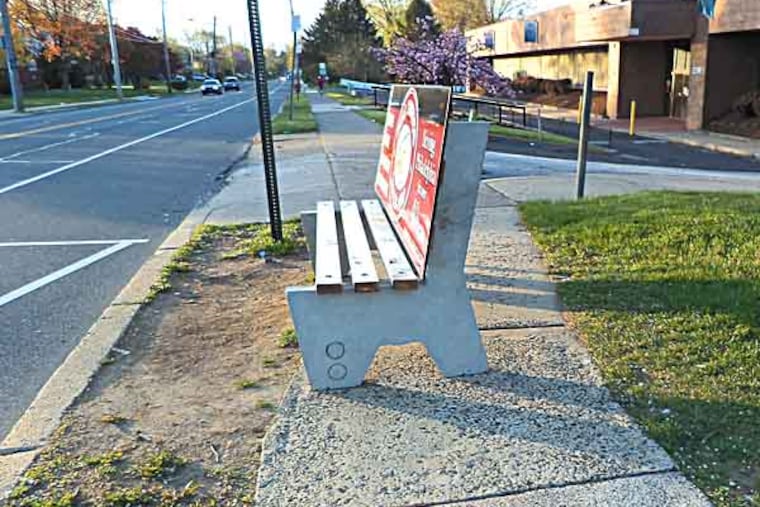Phila. to remove unauthorized ad benches
The city is targeting more than 450 illegal advertising benches on sidewalks throughout Philadelphia, with a plan to remove them and fine their owners beginning next week.

The city is targeting more than 450 illegal advertising benches on sidewalks throughout Philadelphia, with a plan to remove them and fine their owners beginning next week.
The concrete-and-wood benches are regarded as safety hazards and eyesores by the city, said acting Streets Commissioner David Perri.
After originally planning to begin Saturday, the city Thursday decided to give owners five more days to voluntarily remove them.
A four-member Streets Department crew, using a flatbed truck and front-end loader, is scheduled to begin confiscating the benches Thursday.
The extension was granted after an attorney for a group of bench owners requested that the confiscations be delayed, Perri said.
He said the delay was granted "because the less advertising benches that the city has to remove, the less cost there is to the taxpayers." Perri estimated the cost of removing the 450 benches at about $34,000, with a $75 fine for each bench calculated to cover the amount.
The city began receiving numerous complaints about the benches in the fall, Perri said.
He said notices were sent in recent months to about 36 companies that have ads on the benches.
The benches advertise roofing companies, plumbers, diners, check-cashing businesses, and others, Perri said.
A company in "the suburbs" is suspected of manufacturing the benches and selling the advertising space, Perri said. He declined to identify the company because it has not been officially linked to the benches.
"If you call their number they won't even disclose the name," Perri said. "They just ask you to leave your phone number and won't call you back."
The majority of the benches are in the Northeast, but they also are appearing in Northwest and West Philadelphia, Perri said. The benches are a safety concern because they are often placed on sidewalks, he said.
"They create an obstacle for the visually impaired. They are an obstacle for folks in wheelchairs, and they are not maintained well," Perri said. "They accumulate trash and graffiti. They don't meet any design or aesthetic standards. They are a form of blight."
The benches are not licensed or insured against legal claims, Perri said.
"They seem to be putting them where automobile traffic has a clear view of the advertising," Perri said, adding that the benches often are placed at bus stops and sometimes on traffic islands.
The city last cracked down on advertising signs in 1989, Perry said.
"The community has been contacting us and saying, 'It's about time. We're tired of looking at these things,' " Perri said.
He said that the fines would be against the advertisers but that the department also is considering fines against property owners where the benches are located.
Perri said some companies appealed to the Licenses and Inspections Review Board, but the violations were upheld.
In a statement, Frank Lubisky, owner of Union Roofing Co., which advertises on about 300 benches, decried the crackdown.
"Our benches are kept clean without graffiti on them, and they are maintained to make sure they are not damaged in any way," Lubisky said.
He said the company had proposed a bill in City Council that would legalize the benches and raise revenue for the city.
"It's really a shame that with all the other urgent matters within the city, that this has taken precedent when in actuality it is a good thing and a great service we are providing for the citizens of Philadelphia," Lubisky said.